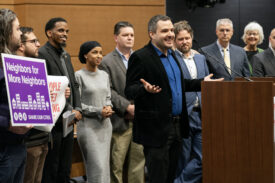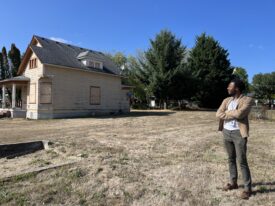In honor of Bike To Work Day, here’s a pop quiz for Seattle readers.
Q. Which infrastructure project is too costly to fund?
a.) The $2.4 billion deep-bore tunnel*
b.) The $240 million Bicycle Master Plan

If you guessed “A”, nope! Easy mistake. The answer is “B.”
Here’s a bonus question.
Q. State law says that Seattle taxpayers are on the hook for cost overruns for which project?
a.) The deep-bore tunnel, a state highway
b.) The Bicycle Master Plan, a city project
Surely, nobody in Seattle would miss the answer to that one. (Folks who live elsewhere may be surprised to learn that the answer is “A.”)
Come to think of it, perhaps the best way to pay for the Bicycle Master Plan would be to build it on the sly, and book it as a “cost overrun” of the tunnel project. The additional funding we need for the bike plan would only add something like a 6% cost overrun, which would practically be a rounding error, if the history of these projects is any guide. Sure, us Seattle taxpayers would pick up the tab, but that’s okay: at least we’d be building something the voting public in town actually supports.
Speaking as a bike commuter, I’m delighted, just delighted, that a decade from now—about the time my son starts cycling — my city will boast the world’s largest bored tunnel, dedicated exclusively to driving at high speeds beneath downtown. What my city won’t have, of course, is enough decent bicycling infrastructure to make it safe for kids to travel on two wheels.
Take another look at the chart above. The green bar would pay for 450 miles of bicycling infrastructure that would touch every neighborhood in the city. Too bad there’s scant money to pay for it. The orange bar will pay for a few miles of new highway parallel to a 10-lane freeway just a mile away. And of course that’s the one officials are determined to build, no matter how much uncertainty there is about costs and funding.
So what do you think? Do we have a sustainability problem?
* Strictly speaking, the deep bore tunnel itself is “only” $1.96 billion. But add in the south end viaduct replacement, which is a necessary add-on to the tunnel, and you end up with a little more than $2.4 billion.








Laura
Wish you folks luck. Sounds like Boston’s Big Dig all over again. For your sake I surely hope it’s not. The Big Dig has been a drain on the whole state, an absolute nightmare!
joshuadf
The original deal was already supposed to be a devil’s bargain including $190m for transit, which Gregoire later vetoed:http://www.kingcounty.gov/exec/news/release/2009/January/13viaduct.aspx
VeloBusDriver
As much as I agree with you that the tunnel is probably destined to become a costly boondoggle, I find this comparison a little weak. Comparing bicycle infrastructure, which is primarily used for local trips, to a state highway, which is used for longer trips, including a significant amount of freight, trying to get through the core of the city, is a bit of an apples to oranges comparison.A more valid analysis would include the relative costs and carrying capacities of a combined transit/surface option vs. the deep bore tunnel. Adding costs of Seattle’s bicycle plan to the surface/transit option would present a much more comprehensive picture and strengthen the argument for the surface option.
Eric de Place
Velo,I see your point, but I really do think it’s simpler than that. On some basic level, it’s all just a question of values. There are limited public resources that we can spend on things—jails, teachers, roads, social security, whatever. What the comparison is intended to show is simply that elected officials (though not necessarily the Seattle public) values roads far more than they value bicycles. In fact, the better comparison might be to stack up all the money going for new roads projects, including 520. In other words, I think it’s less a question of lane-miles, or freight movement, or CO2 emissions—and more a question of values.
John
Thanks, Eric. Great post. McGinn, as expected, made the same comparison this morning at the rally downtown (and at the Walk/Bike/Ride launch as well). These priorities conundrums are starting to stack up, just like the timelines for these projects and plans– and the associated funding needs/asks. It’s, well, business time.That said, I think that a good number of our electeds are far too ready to roll over for somewhat ambiguous “business interests” instead of messaging (or getting?) that in tough economic times we need to prioritize what’ll get us to the vision that we profess we want and invest accordingly. To them, I’d encourage to either do that or stop pretending that we want a healthy, climate-stable, connected and economically vibrant community.
VeloBusDriver
I’d still like to see the two options side by side. Deep bore tunnel vs. Bike plan, pedestrian upgrades, transit, and surface option all rolled into one. A map of Seattle and the areas effected for *less* money would be a powerful image.That all said, I think I get your point and I agree with it. The majority still sees bicycles as a toy or a form of exercise and not as a serious form of transportation. The perception is changing but not quickly enough for my tastes.
MountainGuy
We need to get one concession on the bore. We need to get an exemption from the constitution limitation on gas taxes so that the tunnel can be converted to mass transit when the time comes. But then and some point we need to just amend the whole gas tax amendment to include mass transit as a valid use of gas tax paid resources.
bj h
Just think a little further. In ten years, in twenty years, in thirty years…. will there be enough petroleum for cars in this tunnel? My image is that the tunnel will be full of BIKES! Fantasy or Compromise? Truth or Dare? Or, let’s scare them with high ocean levels! Or go the other way… is there going to be a weight/height limit that restricts commerce?
VeloBusDriver
“The Stone Age did not end for lack of stone, and the Oil Age will end long before the world runs out of oil”– Sheikh Zaki Yamani – former Saudi Arabian oil ministerYes, there will be enough fossil fuel in 200, 300, or even 400 years. The range of substitutes available to replace oil include Natural Gas, Shale oil, Tar sands, Coal, and Methane Hydrates. The real issues are the costs of those substitutes and the damage wrought on the planet in extracting them.There are *lots* of good reasons to cut down on fossil fuel consumption. But the potential of running out of those fuels really isn’t one of them. At least not within the lifespan of several generations.
Michael Mortensen
“The problem we have in Copenhagen is that only 60% of the population bikes to work each day” Niels Tørsløv, Traffic Director of CopenhagenBuild it and they will come … so what do you want: more capacity and safety for bikes (and healthier people) or more cars (and more NOx, SOx, VOx)? Given Seattle’s highway history, the tunnel will become an expensive rush hour parking lot in a few years time.
Conrad
Michael I agree. With respect to transportation- whatever you build will be used. The crux of the issue is, is it important to have more than one option for transportation? Right now, most people drive because it is the fastest and most convenient way to get somewhere. We can’t expect that to change until it is easier to use bikes, buses, and light rail. We can already see that the (relatively small) investment in bike infrastructure has dramatically increased the number of bicycle commuters in Seattle in recent years.
D. R. Miller
This is a great piece. Any chance of getting published as an opinion piece in the Seattle Times? I live in Portland, where as you know, we face virtually the same thing in the Columbia River Crossing project “vs.” sensible bike and other transpo infrastructure. True that we have a more fully fleshed out light rail system, and a *slightly* better bicycle infrastructure (and easier topography), but by and large the two cities are facing the same challenges, the same entrenched political/economic interests, and also the same upwelling of sheer sense in favor of something both cheaper *and* more useful. Too early to write a for-sure obit on the 12-lane version of the CRC, but the winds are certainly blowing that way, and precisely because of ordinary people calling bull**** on the monstrous idiocy of a plan that is clearly the product of a dying age and paradigm.
Jack Flint
How much cargo will the additional bike paths be able to move from the ships and railroads?
Matt the Engineer
[Jack], how much are you willing to spend to subsidize the shipping industry?(besides, most cargo will be moved on city streets after the Viaduct is gone)
Jack Flint
@MattWe’ll subsidize them one way or another; either through a tunnel or through higher prices. Do you want them out there on the city streets or in a tunnel?
Matt the Engineer
I’d much prefer to build in an incentive for goods not travelling by truck, rather than subsidizing the tunnel. If they had to directly add in the tunnel cost to their shipping, many would start shipping by train rather than on our roads. Sadly, that isn’t one of the choices offered by the “stake holders”.”Do you want them out there on the city streets or in a tunnel?” The port says that most trucking will be done on city streets with or without the tunnel. Trucking is a red herring in this debate.
D.R. Miller
Getting people out of cars and onto bikes or transit can have a demonstrable effect on road congestion, easing the transport of large cargo loads, but it only happens when there are sufficient investments in alternative transpo infrastructure.
MicheLynne
Maybe if Seattle is eager to build a deep-bore tunnel, now is the time to propose a more environmentally-friendly use for the idea. For example, how about an underground subway system, such as those used in New York City,London,Singapore, and Germany?